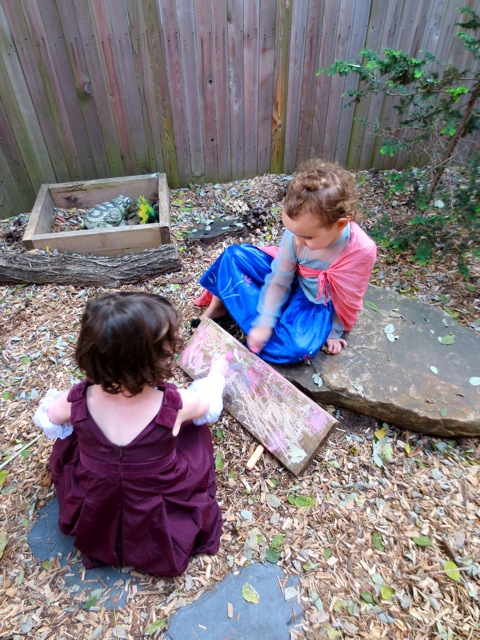Ages, Stages -- Early Childhood Development as a Fluid Process
Twenty two place settings line the tables for our morning snack. A three-year old lands at one of the tables in that way only a three-year old will...She is assured and knows where she is heading and yet if you watch her, it is a wonder that she did not miss the seat altogether and tumble to the floor. Part of the reason for this is that even as she is sitting, she is eyeing the other plates. In the time that it took to approach the table, find her place, and her seat, she has catalogued all the plates. We have an odd collection of vintage diner dishes we use for snack and her place setting features one of the plain ones, only a thin green stripe. She reaches over, suddenly with a grace that belies the lurching that preceded it, picks up one of the blue-flowered plates and switches it with the one in front of her.
She is one of the youngest children in the class. The way she moves through space shows something of her age, but her chronological age does not tell her whole developmental story. She is the youngest of three children in her family. We often talk about how we inherit the play histories of our parents, we pass on our own to our children and older siblings do the same. So in this, this little one has a lot of information at her disposal -- it can be seen, in her case, in an easy going temperament which may be all her own and also an independence and assuredness that is most certainly learned. She simply takes care of this small thing for herself, the fact that she even notices the plates at all says something! This is one of many small things that she takes care of for herself over the course of her day while at the same time missing others, because -hello- she is three!
Early childhood development is a fluid process. The whole human lifespan is, isn't it? One day you're up, the next day you're down, literally and figuratively. We do know that chronological age gives us one piece of data to consider and the rest is about interest, disposition, experience, environment, and as in the story above, birth order.
Since much of our focus at our Cooperative School is on social-emotional development, we think a lot about when and how play skills are developed and these are definitely not tied directly to chronological age. We also look for how that sense of self and others manifests and so much of that is connected to independence and knowing how to take care of yourself by, for instance, getting the plate with the blue flowers for yourself, by yourself.
We turn the corner during dramatic (imaginary) play, developmentally, when children no longer need "the thing that is" to shape their ideas. During a dramatic play session, the children still developing this skill will tell you that they are who they are and the age that they are even as they take little steps into imaginary roles. Then as they develop more play skills, they will tell you "I am..." but they are still very much who they are just with another name and this is enough. The next stage will be "I am and I . . . " for instance, this last week some of the Leaves became super heroes. "I am Spiderman and here are my webs." There was also a Super Monster and Ice man. Ribbons and curtain ties stood in for webs and ice, while roaring was quite sufficient for Super Monster. That said, they mostly cooked dinner and took care of the babies. We could look at these superheroes as very progressive superheroes OR know that what they are doing is slowly departing the familiar into the totally imaginary.
Once they are able to become something and somebody else, with stand-ins for props like the ribbons and curtain ties or even without props at all, they will assure you that, "this is pretend" so you won't worry when you no longer see your student or child standing in front of you. You certainly will no longer recognize them. The transformation is that complete. Their age will not tell me about this developmental milestone. Rather the number of times they begin their sentences with, "Pretend I am..." will. When they add scene and mood to their scenarios and incorporate suggestions and ideas of others into their play, THAT is the developmental milestone I am looking for...
This ability to play and the ability to be independent and self-sufficient is not always linked to age. We expect it to happen by a certain age and there are many things that we can do as parents and educators to help this along, of course, but assigning developmental milestones -- especially those related play and self-help -- are not hard and fast rules. Children still developing social language skills, children on the spectrum, and those possessing an introverted disposition will simply develop play skills along different arcs. Each to his or her own and with a steady increase in comfort levels.

